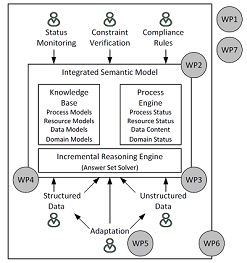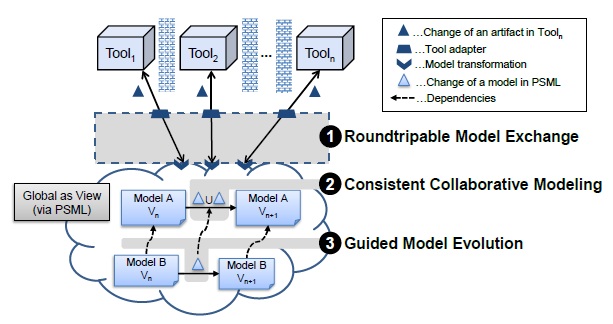Research Activities & Interests
Research Interests
- Semantic Web
- Linked (Open) Data
- Access Policies / Rights
- Model Transformations
- Data & Schema Integration/Matching
- RDF Constraint Checking
- RDFS & OWL Reasoning
W3C Memberships
- Member of the RDF Data Shapes Working Group
- Member of the Permissions and Obligations Expression Working Group
- Member of the ODRL Community Group
Reviewing
- TDKE'16: Transactions on Knowledge and Data Engineering reviewer
- SWJ'16: Semantic Web Journal reviewer
- PrivOn'16: Society, Privacy and the Semantic Web - Policy and Technology PC member
- ISWC'16: International Semantic Web Conference reviewer
- SEMANTiCS'16: International Conference on Semantic Systems PC member
- RR'16: International Conference on Web Reasoning and Rule Systems reviewer
- IJCAI'16: International Joint Conference on Artificial Intelligence reviewer
- ICWE'16: International Conference on Web Engineering reviewer
- AMW'16: Alberto Mendelzon Workshop on Foundations of Data Management reviewer
- ISWC'15: International Semantic Web Conference reviewer
- SEMANTiCS'15: International Conference on Semantic Systems PC member
- LPNMR'15: International Conference on Logic Programming and Non-monotonic Reasoning reviewer
- VLDB'15 Demo Track: International Conference on Very Large Databases reviewer
- WWW'15: International World Wide Web Conference reviewer
- AAAI'15: AAAI Conference on Artificial Intelligence reviewer
- ASE'14: International Conference on Automated Software Engineering reviewer
- SAM'14: System Analysis and Modelling Conference reviewer
- BPM'14: International Conference on Business Process Management reviewer
- ICWE'14: International Conference on Web Engineering reviewer
- ICMT'14: International Conference on Model Transformation reviewer
Research Projects
-
Deployments of complex technical infrastructure products involve complex engineering processes. In this project, we propose ICT support for more rigorous and verifiable process management in such recurring and adaptive engineering processes: SHAPE shall support monitoring & conformance checking in safety-critical engineering processes. We will deploy methods from process mining, semantic technologies and constraint-based configuration.
-
Software systems in complex technological environments, such as production/power plants, railway systems, or medical diagnosis devices, consist of various components and subsystems. Vendors of such systems face the challenge to design models that allow configuring individual components and to incorporating them into a complete system. Because components usually interact in diverse ways by exchanging data, and using services from each other, designing and combining the individual software models to a coherent and consistent system is highly complex which affects production and requires sophisticated ICT support.
For this highly complex task, a variety of software systems and hardware tools are in place that need to interplay within large-scale projects and be reusable in combination.
The goal of COSIMO is to ensure the development of systems of systems within teams of teams without dictating one monolithic tool environment. The overall goal is to provide a framework allowing teams to work with their preferred formalisms, languages, and tools, while ensuring (i) roundtripable model exchange among the tools , (ii) consistent collaborative modeling , and (iii) guided model evolution . It has to be noted that, although this overall goal appears to be quite ambitious at a first sight, its attainability is backed by the fact that ESCPI will heavily build on the results gained in the realm of several previous research projects successfully conducted by the project consortium in the area of MDE.
-
One of the principal achievements of the Semantic Web is to make the information on the meaning of data on the web accessible to machines. This enables the development of tools that support users in finding the relevant data and joining the data from various sources in a meaningful way. To reap the fruits of the Semantic Web, an efficient query mechanism for Semantic Web data and an appropriate way of dealing with the heterogeneity of data on the web are required. The goal of this project is precisely to lay the foundation for an efficient evaluation of queries in the Semantic Web query language SPARQL. To take care of the heterogeneity of data on the web, we will extend our query evaluation techniques to a combined query language that integrates also features of XQuery - the standard query language for XML data. In order to achieve these goals we will apply and significantly extend well established query optimization techniques from relational databases.


